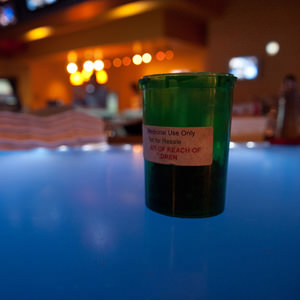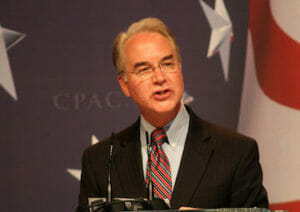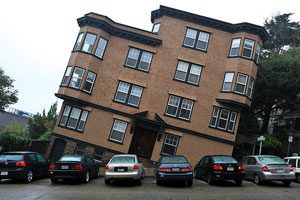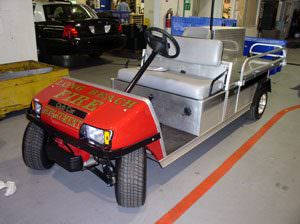Marijuana Delivery Services Evade Bans on Dispensaries
A flourishing and unregulated industry of pot delivery services is circumventing bans on storefront dispensaries and bringing medical marijuana directly to homes, offices and more unconventional locations across California, records and interviews show.
By Gary Cohn and Michael Montgomery, California WatchEditor’s note: This report was produced by California Watch, a project of the Center for Investigative Reporting.
A flourishing and unregulated industry of pot delivery services is circumventing bans on storefront dispensaries and bringing medical marijuana directly to people’s homes, offices and more unconventional locations across the state, records and interviews show.
The unfettered delivery of marijuana through hundreds of these services highlights how quickly California’s fabled pot industry is moving from the shadows and into uncharted legal territory. These new couriers include enterprising farmers, business entrepreneurs and even a former Los Angeles pot dealer methodically switching her former clients to legal patients.
In newspapers and on the Internet, hundreds of “mobile dispensaries” advertise a wide range of strains and other products, such as brownies and cookies laced with THC, the active ingredient in marijuana. One service delivers organic vegetables along with medical marijuana, as part of a “farm-direct” service.
Some operate in multiple counties, including jurisdictions where storefront dispensaries are banned, or make local deliveries to drop-off points, such as Starbucks parking lots and gas stations. At least three ship to clients around the state using private prescription-drug couriers.
Although delivery of medical marijuana is not a new phenomenon, advocates say the growth of these services could be a game-changer in the state’s pot war, which pits law enforcement, elected officials and community groups in some localities against dispensary owners and patients.
And these businesses could increase in popularity if voters approve an initiative on the November ballot that would legalize pot possession.
“They’re delivering the product better, cheaper, more discretely and probably at a higher profit rate than dispensaries,” said Allen St. Pierre, director of the National Organization for the Reform of Marijuana Laws, which advocates legalization. “These delivery services are starting to grab more and more market share.”
A question remains on whether these services are legal. Some local and federal officials say delivery services violate the 1996 Compassionate Use Act that legalized medical marijuana in California for qualified patients, as well as other laws. The services are viewed as a way to circumvent local regulations clearly banning dispensaries.
“They’re transporting drugs,” said Tommy LaNeir, director of the National Marijuana Initiative, which is funded through the White House’s drug policy office. “It’s a trans-shipment operation that’s trying to bypass the ordinances that have been set up by cities and counties. It’s as simple as that.”
The exact number of delivery services operating in California is unclear, since the state does not keep a registry of medical marijuana distributors or outlets. In April, 758 services advertised direct delivery of marijuana to patients on Weedmaps.com, a commercial listing service.
Those numbers have nearly tripled in the past 18 months and grown by 39 percent since February, as more counties and cities began regulating storefront dispensaries or banning them outright, according to Justin Hartfield, owner of Weedmaps.com.
More than half the couriers who advertised in April said they were located in the Los Angeles region. Other services clustered around metropolitan regions, such as San Francisco, San Diego and Sacramento — with most regions experiencing steady growth. The number of couriers advertising within L.A. has jumped from 110 to 161 since February. San Diego saw an increase from 68 to 101 over the same period.
A total of 129 cities and nine counties in California have all banned medical marijuana dispensaries. An additional 96 cities and 13 counties have moratoriums, according to Americans for Safe Access. Yet, in many of these “dry” communities, pot delivery services appear to be flourishing. The number of couriers advertising in Riverside County, for instance, has increased from 76 to 105 since February.
For the state, the trend has caught officials flat-footed and unable to pinpoint any legal guidelines that directly address the delivery of medical marijuana by courier or mail. It’s clear that sending drugs through the postal service and cultivating pot for sale violates U.S. law, but most marijuana growers know federal prosecutions are rare these days.
“Delivery services are a relatively new creature, one that has not been directly addressed by the courts or in legislation,” said Peter Krause, a California deputy attorney general who helped write the state’s landmark guidelines on medical marijuana in 2008.
The state’s 1996 initiative and a companion law approved by the Legislature in 2003 granted cities and counties most of the authority over implementing the Compassionate Use Act. But no city council or board of supervisors has explicitly outlawed or legalized delivery services, according to Americans for Safe Access.
Senate Bill 420 — signed into law by former Gov. Gray Davis during his final weeks in office — appears to protect individual patients from prosecution for “possession, transportation, delivery, or cultivation of medical marijuana” under legal limits. The law also allows patients and their primary caregivers to “associate” with each other to “collectively or cooperatively” cultivate pot for medical purposes.
To some law enforcement officials, the law is unambiguous. John Hall, a spokesman for the Riverside County district attorney’s office, said the county has banned storefront dispensaries and that delivery services are prohibited, although he could not site a specific law or regulation on the subject.
“It is the position of this office that based on current law, all mobile medical marijuana operations are illegal,” Hall said. “That would include those that may be based in Riverside County as well as any which may be based elsewhere and come into the county to attempt to do business.”
Hall said the Riverside district attorney’s position is based on a September 2006 legal analysis written by the DA’s office that concluded “medical marijuana is not legal under federal law, despite the current California scheme.” The white paper is silent on the subject of delivery services, but concluded that storefront cooperatives and dispensaries are illegal.
Other law enforcement officials said California law clearly does not allow the distribution of medical marijuana to hundreds of people by a service or any single person.
“I don’t see anything that suggests that when voters passed the Compassionate Use Act, they envisioned [marijuana] delivery services,” said Joseph Esposito, head of narcotics for the Los Angeles district attorney’s office.Dispensaries under pressure
Nowhere is the boom in pot delivery more evident than in Southern California. Until recently, Los Angeles was ground zero in the rapid growth of medical pot outlets, with dispensaries outnumbering Starbucks locations along some commercial strips.
That era may be ending. In January, the Los Angeles City Council approved an ordinance that led city attorneys to order the closing of 439 dispensaries. An estimated 135 will be allowed to remain if they follow new regulations, but action could be imminent on the others.
The Los Angeles city attorney’s office has warned dispensary owners in violation of the ordinance that they could face civil or criminal penalties if they do not close by June 7.
In the face of the crackdown, some dispensaries have already shuttered their storefronts and rebranded themselves as delivery services. “They tell us, ‘we still want to be listed on your website. We’re just turning into a delivery service,’ ” said Hartfield of Weedmaps.com.
Dann Halem, a former freelance journalist, founded the Artists Collective delivery service 18 months ago after he started using marijuana to treat a rare hormone condition. He quickly saw the benefits of distributing marijuana directly to customers rather than running an expensive storefront.
“You don’t have to rent property,” he said. “You don’t have to deal with security cameras. You don’t have to have a security guard. We have glass dealers calling us, thinking we’re a storefront, asking us if we’re interested in some bullet-proof glass. You could spend money left and right to start a store.”
Together with a business partner, Halem logs hundreds of miles each week to fill phone and Internet orders for 500 or so clients. He said he doesn’t charge extra for delivery, but sets a minimum amount of marijuana a patient must buy, depending on the distance. If the customer is within 10 miles, the minimum is one-eighth of an ounce; within 20 miles, one-quarter of an ounce; within 30 miles, three-eighths of an ounce.
“The more gas we have to use, the more wear and tear on the car, the higher the minimum is,” Halem said.
Just days after Los Angeles ordered a crackdown on the city’s teeming medical marijuana dispensaries, Halem drove to a downtown residential hotel to deliver half an ounce of high-grade pot. At the hotel, Halem met up with Leonard Lombardo, a 50-year-old Gulf War veteran undergoing treatment for throat cancer. The two men spoke casually and then Lombardo paid for the marijuana, which his doctor had recommended to treat chronic pain and stimulate his appetite.
“These are people who don’t have cars. They can barely walk,” said Halem, who nevertheless acknowledges that most of his clients are not severely ill. “So it’s absolutely critical for there to be delivery services in some way.”
Kris Hermes, a spokesman for Americans for Safe Access, said if delivery services are operating as collectives or cooperatives they are protected under state law. He said all members must be qualified patients or caregivers, the operator must verify each patient’s status under legal guidelines and the delivery services must organize as nonprofits.
For his part, Halem is still taking precautions. He hired a lawyer and an accountant to help him establish his collective as a nonprofit California public benefit corporation. Profits are donated as grants for artists, he said.
Late last year, he moved his base of operations out of Los Angeles in the run-up to the city council vote. He now has an office in West Hollywood, which has well-established medical marijuana regulations. But he delivers to patients living throughout Los Angeles. Still, he conceded that a lack of regulations covering delivery services has left open the possibility of abuse.
“To start a delivery service, whether your intentions are good or bad, you need a car, a cell phone and marijuana,” he said. “That’s not the way we operate. But I’d say the majority of delivery services are just that. And they really are in a lot of respects glorified drug dealers because there’s no oversight, there’s no accreditation, there’s nothing.”
Halem said he’s sent e-mails to the city councils in West Hollywood and Los Angeles urging members to regulate the marijuana delivery trade. But officials in Los Angeles told California Watch that the issue was not raised during the debate over medical marijuana.
Los Angeles City Councilman Dennis Zine said the council’s decision to restrict storefront dispensaries was driven by complaints from community groups and law enforcement. So far, the council hasn’t received any complaints about delivery services, he said.
“Who’s going to complain?” Zine said. “The person who’s receiving [the marijuana] is not going to complain. The person who’s delivering is not going to complain. The neighbor is not going to complain because they don’t know what’s going on.”
Low overhead, lax regulations
In Northern California, there are fewer delivery services but some of the operations cover large areas, spanning multiple counties and cities.
One new company, Mediharvest, promises to deliver marijuana to qualified patients anywhere in the state via commercial carriers. Mediharvest promotes its service to people who “don’t want to be seen at the store,” who want high-quality pot, who don’t want to support illegal drug cartels, and who “want to change the attitude of medical marijuana use in America.”
Another new online dispensary, C420, says it will ship pot overnight to qualified medical marijuana users at “almost any legal address in California.” The owner, who goes by the assumed name of Matthew Lawrence, said the Bay Area-based company is registered as a nonprofit collective and has signed up 1,000 qualified medical marijuana users across the state since its launch in April.Lawrence said he distributes marijuana from hubs in Northern and Southern California using third-party carriers “who adhere to pharmaceutical delivery protocols.” He declined to name the carriers, but claimed the operation was in line with state law.
“We’ve done our homework in terms of what is allowable and legal,” he said.
Avoiding the costs associated with operating a storefront saves his operation money, but Lawrence said running a delivery service isn’t cheap. And robbery is a real threat. That’s one reason he expects only a few operations could grow into large-scale businesses — unless pot is legalized.
“To set up a delivery service that could go corner to corner around the state would be hugely expensive,” he said.
Elsewhere, some operations are modeling themselves on organic farms that deliver distinctive boxes of fruits and vegetables directly to customers’ homes. Matthew Cohen, owner of Northstone Organics, pioneered what he calls “farm-direct medical marijuana.” The Ukiah-based cooperative grows and delivers marijuana to a network of some 500 qualified patients in the nine Bay Area counties.
On a recent afternoon, Cohen stood in a rain jacket and muddy boots, scanning a large garden patch at the rear of his 10-acre farm. Surrounding the area was a network of laser trip lines and high-resolution cameras.
Marijuana from last year’s crop is stored in small canning jars in a nearby warehouse. Each week, after taking orders from Northstone’s website and over the phone, Cohen packs the jars into small paper bags.
Northstone’s business has grown briskly. Six months ago, Cohen was driving into the Bay Area twice a week and making the deliveries himself. Now he’s hired new workers who make deliveries five times each week.
In some Bay Area newspapers, Northstone advertises its product as “sustainably grown” in greenhouses, unlike much of the marijuana offered at storefront dispensaries, which is cultivated indoors under powerful, 1000-watt grow lights.
By keeping production and distribution costs low, Cohen said he could offer his medical marijuana at a discount of 30 to 40 percent. And Cohen’s operation recently got a boost when Mendocino County passed regulations increasing the number of pot plants that can be legally grown on a parcel of land, from 25 to 99. This allows him to compete more effectively against large, urban storefronts.
“It’s a competitive marketplace,” he said.
Cohen said he has obtained business licenses for every county he operates in. And officials from eight Bay Area towns and counties said their current regulations do not apply to delivery services based outside their jurisdiction.
“We are not regulating those types of operations,” said Jim Soos, a spokesman for San Francisco’s health department.
From dealing drugs to “dispensing medicine”
Marijuana delivery services are attracting a wide range of players. Some sold drugs on the black market for years and now see an opportunity to bring their operations out of the shadows.
“In some people’s minds, I’m a drug dealer,” said one woman who runs a delivery service in Los Angeles and agreed to talk about her business under the condition that her name and specific areas of operation within Los Angeles County not be revealed. “But what I’ve tried to do is comply to the laws of Los Angeles County so that I am not just the average pot dealer, but am dispensing medicine to my patients.”
Like most delivery services, the woman’s business operates as a nonprofit collective, with members making “donations” in exchange for marijuana cultivated by growers in the Los Angeles area and rural regions of California.
But to transform her former customers into legal patients, the woman holds unusual gatherings: Sunday brunches at her home where a doctor evaluates the invited guests in a private room at a discount rate and then signs off on recommendations for medical marijuana.
On a recent Sunday afternoon, about 40 people gathered at the woman’s home for a “doctor’s party.” They ranged in age from early 20s to around 60, included slightly more men than women and appeared to include mostly young and middle-age professionals, and a few stereotypical-looking stoners.
The invited guests paid $100 apiece to see the doctor – less than the $175 he normally charges for an office visit.
“It’s what you would normally go through in the doctor’s office, only in a much more comfortable environment,” said the operator of the collective.
She and her small, all-female staff are on call noon to 8 p.m. every day and deliver anywhere in Los Angeles County. She says she employs female drivers because they are less threatening to customers. On an average week, the service delivers one to two pounds of marijuana packaged into colored packets usually weighing an eighth of an ounce and costing between $50 and $70.
“I have doctors. I have lawyers. I have [school] principals,” she said on a recent delivery run, which included a Starbucks parking lot and a film production studio. “I have teachers. I have nurses, doctors, who don’t want to be seen going into a dispensary.”
As the wait to see the doctor stretched to an hour, the hostess led guests to a backyard buffet of mimosas, bagels and lox, chili and marijuana-infused edibles, including blueberry crumble bars and assorted cookies.
At the rear of the property was a free-standing garage converted into a studio living area. Inside, a card table displayed thick, neatly rolled joints, grouped by marijuana strain. Two bongs — one of them almost two feet high — stood alongside bowlfuls of trimmed, high-quality buds.
While becoming a collective has perhaps legitimized the woman’s business, it has not led to many additional customers. The woman said she has fewer clients and had to drop her prices to be competitive with storefront dispensaries. When she sold pot on the black market, she had about 500 clients. She now has about half that amount. But with hundreds of dispensaries facing city orders to close, the woman is hoping to recover lost business as dispensary clients move instead to delivery services.
“I absolutely believe it will help my business,” she said. “People will return who have been going to dispensaries out of sheer convenience.”
This story was reported in collaboration with KQED public radio, with assistance from the USC Annenberg School for Communication & Journalism. It was edited by Robert Salladay and copy edited by William Cooley.
California Watch is a project of the Center for Investigative Reporting, with offices in the Bay Area and Sacramento.
Multimedia Links:
MAP: Medical marijuana delivery services in California June 3, 2010 | Lisa Pickoff-White and Sarah Terry-Cobo
VIDEO: Delivering marijuana from plant to pipe June 3, 2010 | Lisa Pickoff-White
From KQED’s California Report Medical Marijuana Finds Another Avenue in Los Angeles Friday, June 4, 2010. Reporters: Michael Montgomery & Gary Cohn
Your support matters…Independent journalism is under threat and overshadowed by heavily funded mainstream media.
You can help level the playing field. Become a member.
Your tax-deductible contribution keeps us digging beneath the headlines to give you thought-provoking, investigative reporting and analysis that unearths what's really happening- without compromise.
Give today to support our courageous, independent journalists.





You need to be a supporter to comment.
There are currently no responses to this article.
Be the first to respond.